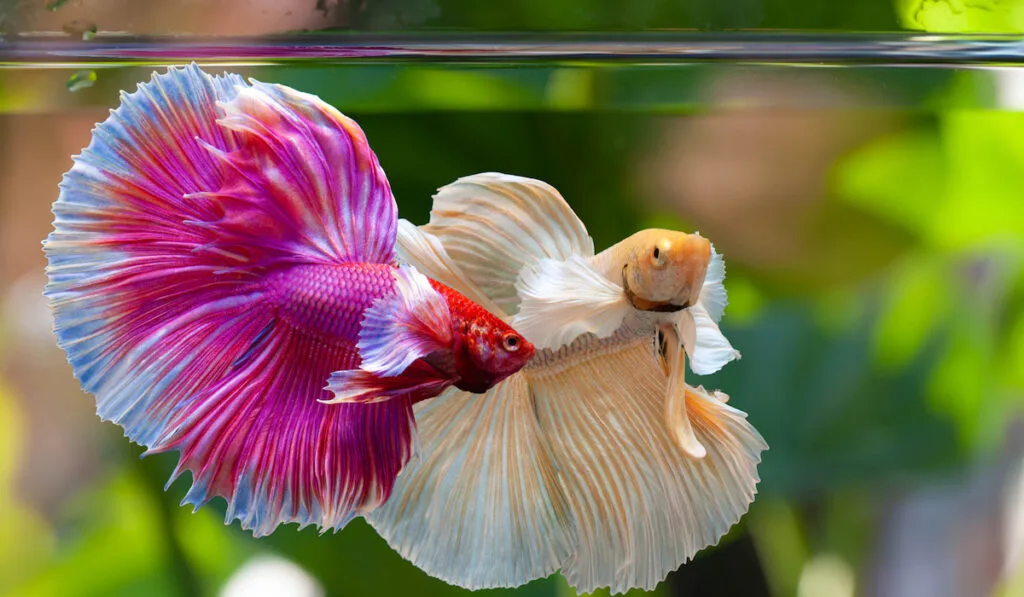If you are excited to introduce a new pet fish into your home, you’ll want to make sure you’ve got all of the information you need to care for it properly. Since fish are excessively sensitive to their environment, it’s important to know their needs, as well as their habits and reactions.
Do betta fish sleep? Fish, like all living things, need sleep to survive. Betta fish usually sleep during the night, but also take small naps during the day. Since fish do not have eyelids, it is important to recognize their body language to find out when sleep occurs.

As you get to know your betta, you’ll start to learn more about sleep patterns. But, going in, it’s important to figure out how to recognize the difference between sleep and other behaviors. It’s good to have a baseline for what is considered normal in your new pet since some actions indicate injury or illness. We’ll get into all you’ll need to know about your new betta.
Table of Contents
Sleep Habits of Betta Fish
You don’t want to be staring at your fishbowl, worrying, “Is that normal?” So, take a look at some of these details about betta fish sleep: what their body does, what sleep looks like, what their best sleep environment is, and more.
Do Betta Fish Close Their Eyes?
Well, they might if they had eyelids. So, the main reason it is difficult to tell when fish sleep is their lack of eyelids. Humans need eyelids to protect them from things in the environment. They also help to keep the eye moist. Fish, however, reside in the perfect environment for their eyes.
They do not become dried out because of the constant contact with water. It is easier to understand how fish sleep by redefining how you think of sleep. For fish, you must consider the state of their brain and body position, instead of closed eyes.
Sleep Patterns of a Betta Fish
Observe a betta, and you’ll find out this is what sleep looks like:
- Your betta fish may move less at night or for short intervals throughout the day. Even in captivity, fish retain their natural instincts to avoid predators. They may take short “naps” during the day while remaining partially awake.
- You may notice that your fish resides on the bottom of the bowl or aquarium for several hours during the night. While fish rarely stop moving, they do cease vigorous swimming while resting. Look for subtle changes in movement for short periods of time during the day and longer periods of rest in the evening.
- Fish naturally seek out a safe place to rest. You can help your betta fish sleep by providing proper decorative items in the bowl. You can place faux plants, gravel, or a cave on the bottom of the aquarium.
Body Language
It is important to understand what fish look like when they become ill or close to death. This will help you differentiate between restful sleep and something being terribly wrong:
- Your fish should not roll onto their side. This can happen a few days or hours before the fish dies.
- They should not fall to the bottom. This is also an indication that they are having trouble.
- Floating at the top of the tank is a bad sign. Once a fish passes away, they usually float fully to the top of the water.
This is often the most difficult part of owning a fish. You cannot keep them comfortable near the end of their life like other pets.
How to Know if It’s Just Sleep
Movement slows down during sleep, but their position should not change drastically. Your betta fish should flick their gills or tail when they sleep to keep the oxygen flowing through their body.
This also helps them stay balanced and upright. Drastic changes in position may indicate illness or impending death.
Hiding is Usually a Good Thing
It is not a big concern to see your fish hiding. Think about how fish act in the wild. They must act in a way that preserves their survival. Since captive betta fish must reside alone, many pet owners simply purchase a plain fishbowl.
Give your betta fish a variety of items to chose from when they need to hide. Fake plants and small caves mimic a more natural environment.
Gravel or stones for the bottom of the bowl make the bowl pretty to look at. Some dyes or textures can make the water toxic or cloudy, however. Try to find natural items with no artificial dyes or chemicals.
Many betta will take advantage of a betta hammock to sleep on. This four pack would give most bettas a good number of options with some placed closer to the top of the tank and others a little lower.
Betta Sleep Best in a Steady Environment
All fish can develop problems from sudden changes in temperature. The water for your betta fish should remain 78-80 degrees Fahrenheit. Betta fish naturally live in a tropical environment. Your fish may stay alive in a different temperature range; however, they can experience severe discomfort.
Even for a single fish, it is best to set up a proper aquarium. You can find small versions that use less powerful filters. Be sure to add a thermometer to your aquarium so you can monitor the water temperature constantly.

You can also purchase a water heater to maintain the ideal temperature. Check with your local pet shop and/or a reputable online source for more information about the betta environment.
You must act carefully when first bringing your fish home, and when changing water in the tank. Sudden temperature changes can bring rapid fatality. Learn to recognize the signs of a fish in distress from improper temperature.
- Too cold? An environment that becomes too cold may result in a very slow-moving fish. Your betta may also move towards the bottom or side of the habitat. This means their metabolism is not functioning properly.
- Too hot. Your fish may appear frantic if the water becomes too warm. Look for consistent, fast swimming. If water stays too warm for a long period of time, your fish may not live long.
Evaluating Changes in Betta Fish Movement
Fish can exhibit various behaviors and energy levels throughout the day. Most pet owners learn about the common movements by watching their fish daily. This can help you recognize unusual behaviors, as well.
A problematic behavior may persist for several minutes or hours. Once a fish becomes ill, most pet owners allow nature to take its course.
Vet care for fish is expensive and often ineffective. If your betta lives in a community tank, try isolating him just in case.
A hospital, or quarantine tank, is a great addition anyhow and gradually raising the temperature of a tank can even kill some parasites. (source)
If your betta lives alone you can attempt things, like increasing temperature, without moving him out of his familiar environment.
If Your Betta Fish Isn’t Sleeping
If you have multiple betta fish, it is a good idea to clean any equipment after the death of a fish thoroughly. Do not place a new fish in a bowl or tank until you sanitize it. If you have a net that you must use to remove fish for cleaning day, clean it before using it on our other bettas, as well.
Get Prepared to Bring a Betta Home
Take a walk through your local fish store before you bring home your betta fish. You can look at different varieties of fish and equipment. It can also help to bring home your items and set them up before you bring the fish home.
It can take time to set up a proper aquarium with a filter. You must also get the water set to the proper temperature. If you do not have everything ready, your fish must remain in a bag from the pet store while you set it up. This can result in unnecessary stress on the fish.
Any change in the environment can cause problems with fish, so try to make the transition from the store to home easier by getting their new home ready first.
Summing Up
Betta fish do sleep, and it is interesting to watch their various behaviors throughout the day. Take the time to learn the normal movement patterns of your betta. It is much easier to tell when something is wrong when you know how your fish normally behaves at different times of the day.
